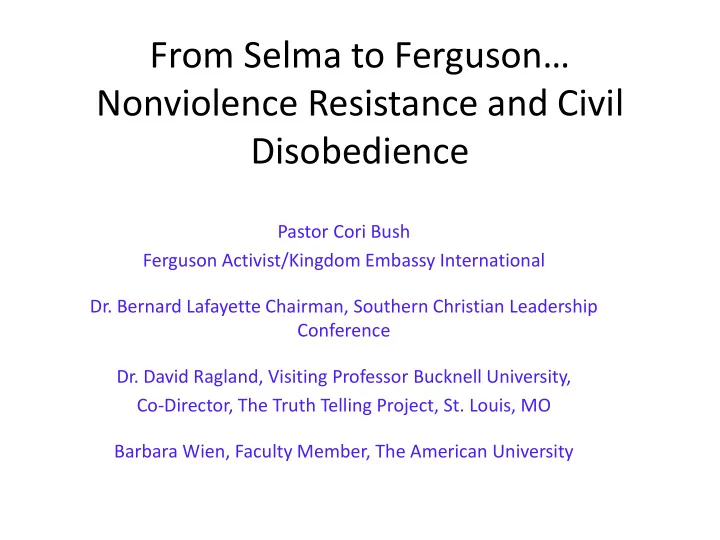

From Selma to Ferguson… Nonviolence Resistance and Civil Disobedience Pastor Cori Bush Ferguson Activist/Kingdom Embassy International Dr. Bernard Lafayette Chairman, Southern Christian Leadership Conference Dr. David Ragland, Visiting Professor Bucknell University, Co-Director, The Truth Telling Project, St. Louis, MO Barbara Wien, Faculty Member, The American University
Interactive National Map Police Shootings 2000-2014 4,285 police killings nationwide http://www.killedbycops.org/
The Rise of Warrior Cops and the Crisis of Police Brutality
Ten Reasons for Police Violence Lack of training in nonviolent solutions and skills Militarized with weapons from Iraq and Afghan wars Blacks and Latinos criminalized in public’s mind, unfairly stereotyped in media. Police succumb too 84% of police see widespread misconduct, but afraid to report fellow officers Definition of what is brutality varies widely (1985 & 1995 Supreme Court rulings gave wide discretion) No consequences when cops abuse; prosecutions rare Cost of misconduct law suits paid by taxpayers Fallout from Central American wars in 1980s give rise to gangs coming across border to U.S. cities. Police feel under siege from so many guns on U.S. streets. Domestic internal arms race Deflection of deeper responsibility about U.S. history
10 Major Reason for Police Brutality
Nonviolent Strategies to Counter Police Brutality Discuss the legacy of slavery in the U.S. Acknowledge racism Nonviolence trainings to respond to conflict with skills Bias awareness across all institutions, particularly mass media Neighborhood dialogues/teach-ins examining White Privilege; “Courageous Conversations” to reverse bias in all of society Civil resistance training for defense of minority communities Truth telling hearings and speak-outs to document abuse Unified, national database of police misconduct No transfer of military equipment to domestic life Greater citizen oversight and review boards of police, including body cameras Abusive cops pay direct penalties and costs of law suits Define what constitutes brutality; close Supreme Court loop-holes Separate prosecutors from cozy relationship with cops Stronger gun laws to stop the spread of weapons on U.S. streets, so cops don’t feel so besieged and “out-gunned”
Two Americas • Current Policing Practices Policing reflects the will of American Society • Police conflate protesting with being anti- police • Police protect citizens • Police protect private property • System of winners and losers • Criminalized population justifies losing
Internal Logic of Policing/Militarism • Goes beyond the desire of American Public • American Police- resemble standing armies • War on drugs/poverty – don’t do what it claims to do, i.e. reduce crime ( Brennan Report on Prisons, 2014; Thompson, 2015) • Is the role of policing to maintain its institution & reinforce status quo? • Violence
. . .
Demand #1 -- Political Accountability for the Death of Michael Brown, Jr. Demand #2 -- Special Prosecutor for All Deadly Force Cases Demand #3 -- Police Held Accountable for Use of Deadly Force Demand #4 -- End Over-policing and the Criminalization of Poverty Demand #5 -- Representative Police Force and Intentional Officer Training Demand #6 -- End Funding for Discriminatory Police Forces Demand #7 -- Truth and Reconciliation Commission on Structural and Systemic Inequalities in Missouri Demand #8 -- The Right to Protest Demand #9 -- Pass the National "End Racial Profiling" Legislation
Displays of Flags & Performances Symbolic of Plays Colors Non-Violent Leaflets Occupations Wearing of Symbols Turning One’s Religious Back Processionals Marches Protest Strikes Civil Disobedience Vigils Slogans
Reached over 100,000 people in one • weekend Over 300 cars turned away • An estimated 40% profit reportedly was lost • Projected Black Friday sales expected to be 3% • over 2013 sales Sales plunged 11% compared to 2013, • representing a dollar drop off of nearly $7 billion
Not your parents movement
Continuation of the Movement: From Selma to Ferguson
50 th Anniversary • From Selma to St. Louis • History of Selma • Waging Nonviolent Civil Disobedience • Selma Today • Continuation of the Movement
Truth-telling Reconciliation not possible until • – Resetting oppressive relationships – Structural change is underway Stories from the ground up have the • possibility to direct change Acknowledgement of tragedy • Healing • Part of the Moral Inventory Necessary • for Reconciliation ( Scott, 2014) Community transformation • – Ground up shifts toward from procedural/punitive toward restorative justice – All ethics and morality come from the lived experience (Aristotle, Ragland, 2012; Walzer, 1987) Self determination •
Truth-telling • Might lead to Legislative Fixes – Local ordinances changed based on human rights (ford foundation, 2005) • Community Initiative development • Connections with other communities • Stories present history from the communities perspective • Educational for emerging generation to see • Work toward change is heal and self-empowering • Reconciliation becomes more possible
Possibilities • Relationship between Police and Community – Sao Paulo Brazil – Richmond, CA – Not Presidential Task Force on Policing/Sweet Tea
References Davis, F. (2014) What does Truth and Reconciliation for Ferguson and • Beyond Look Like? Yes Magazine. Retrieved 2- 26-15 http://www.yesmagazine.org/peace-justice/this-country-needs-a-truth- and-reconciliation-process-on-violence-against-african-americans Roeder, O. et. al. (2014) Brennan Report on Prisons, retrieved • https://www.brennancenter.org/publication/what-caused-crime-decline Scott, I. (2014) eds Crimes Against Humanity in the land of the Free: Can a • Truth and Reconciliation Process Heal Racial Conflict in America? Praeger Press. Thompson, J.(2015). Did the US Prison Boom Lead to a Crime Drop? New • Study Says No. Intercept. Retrieved 2-26-15 https://firstlook.org/theintercept/2015/02/19/bienvenue-louisiana- worlds-incarceration-capital/
Recommend
More recommend